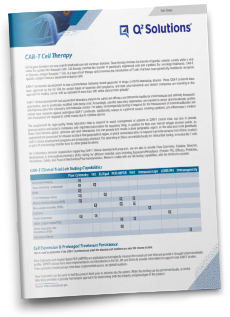
CAR-T therapy support
Lab solutions for CAR-T immuno-oncology drug development
CAR-T Cell Therapy
For treatment applications in Oncology, CAR-T (Chimeric Antigen Receptor T Cell) is a type of cell therapy which involves the introduction of T cells that have been genetically modified into the body of a cancer patient. As a laboratory services organization supporting CAR-T clinical development programs, our lab testing capabilities include the following:CAR-T Clinical Trial Lab Testing Capabilities
| Flow Cytometry | IHC | ELISpot | PCR/ddPCR | NGS | Immunoassays | LCMS/MS | Immunogenicity | |
| Immunophenotyping | ||||||||
| Tumor Infiltrating Lymphocytes | ||||||||
| PBMC | ||||||||
| T Cell Stimulation Assay | ||||||||
| Minimal Residual Disease (PCR) | ||||||||
| Microsatellite Instability (PCR) | ||||||||
| Cytokines | ||||||||
| Protein Expression | ||||||||
| cfDNA (Digital Droplet PCR | ||||||||
| Vector Integration site / Persistence (PCR) | ||||||||
| Antibody-Drug Antibody |
We provide Flow Cytometry, Cytokine, Genomic, BioAnalytical & Immunohistochemistry (IHC) testing for different intended uses including Expansion/Persistence (Pseudo PK), Efficacy, Prediction, Resistance, Safety, and Proof of Mechanism/Pharmacodynamics.
Cell Expansion & Prolonged Treatment Persistence
This is used to determine if the CAR-T is present and what the absolute cell numbers are over the course of time.
Flow Cytometry and droplet digital PCR (ddPCR) are applicable technologies to measure the construct over time and provide a "pseudo" pharmacokinetic profile. ddPCR assays have been implemented in our laboratories in the US, UK and China to provide information to support local CAR-T studies. Flow cytometry-based assays have been implemented across our global locations.
Flow Cytometry can be used to test the product itself prior to infusion into the patient. While this testing can be performed locally, a central laboratory provides a globally harmonized approach for determining both the integrity and phenotype of the product.
Efficacy
Is the CAR-T stimulating, infiltrating, persisting and proliferating?
Flow Cytometry and NGS (next generation sequencing) approaches are being used for MRD (Minimal Residual Disease) determination in B-cell disease.
CAR-TIL (tumor-infiltrating lymphocyte) measurement is a useful efficacy tool to monitor resultant migration of Effector cells. Also, ddPCR can be used to monitor the presence and abundance of the CAR-T and Flow Cytometry utilized to determine phenotype of the CAR-T on administration to the patient and to measure persistence throughout the treatment.
Resistance
Is there evidence of lack of target engagement or is their evidence of residual disease?
Antigen loss on the tumor cells can indicate resistance. CAR-T immune checkpoint expression with typical markers (for example, PD-L1, FoxP3, Lag-3) using Flow Cytometry and IHC technologies can also indicate resistance. Unwanted immunogenicity to the CAR-T may also impact the efficacy of the therapy. Detection of the presence of anti-drug antibodies (ADA) and neutralization properties of the response is possible via conventional ADA and/or cell-based methods, including flow cytometry assays.
Safety
What is the biological evidence behind Cytokine Release Syndrome (CRS) and Neurotoxicity?
Immunogenicity testing in CAR-T clinical trials is commonly performed also from the safety perspective. Assays that detect antibodies to the CAR-T construct can determine cellular and/or humoral responses. Typically, these assays are run under GLP quality systems, for which test data is provided back early within the clinical trial.
Cytokines, Chemokine and Pro-Inflammatory panels of assays using MSD or Luminex technology are used extensively to explain Cytokine Release
syndrome – a common safety event with CAR-T. In addition, many of the next generation cell therapies have been engineered to synthesize and release cytokines, chemokines and other factors. Depending on the context and risk profile, the concentrations and immunogenicity of these products may require analytical support.
Proof of Mechanism/Pharmacodynamics
Evidence that the target is engaged to result in a biological change of the target and or downstream effect.
There are several approaches to demonstrating proof of mechanism. One is by measuring cytokine release. Another way is with use of immunophenotyping by Flow Cytometry, which can provide evidence of both immune status modulation as well as CAR-T persistence and differentiation status through








